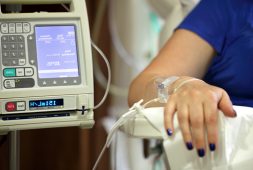A Cure For Multiple Sclerosis With Exciting Outcomes In The Stem Cell Injection Clinical Trials

A collaborative research effort involving experts from Europe and the United States has discovered that stem cell treatment appears to safeguard the brains of individuals with Multiple Sclerosis (MS) from further damage. In groundbreaking human clinical trials, patients who received stem cell injections showed no increase in disability or exacerbation of symptoms. Published in the journal Cell Stem Cell, this promising study is anticipated to pave the way for subsequent clinical trials aimed at providing effective treatment for progressive MS.
Globally, over two million people live with MS, and despite existing treatments that can alleviate the severity and frequency of relapses, a significant proportion of patients enter a debilitating secondary progressive phase within 25 to 30 years of diagnosis. MS, an autoimmune disorder akin to Lupus, ALS, and Crohn’s, is characterized by the immune system attacking and damaging myelin—a protective tissue sheath around nerve fibers—disrupting communication within the brain and spinal cord.
In progressive forms of MS, a microglial immune cell can assail the central nervous system, leading to chronic inflammation and nerve cell damage. Recent strides in science involving the transplantation of stem cells have fostered hopes that therapies could be developed to mitigate this damage.
Prior experiments on mice by the Cambridge University unit within the new study team demonstrated that reprogrammed skin cells, transformed into brain stem cells and transplanted into the nervous system, could reduce inflammation and potentially aid in repairing MS-induced damage.
A groundbreaking early-stage clinical trial was conducted by a collaborative research team composed of experts from the United Kingdom, the United States, Switzerland, and Italy. The trial focused on the injection of neural stem cells into the brains of 15 patients diagnosed with secondary multiple sclerosis (MS) from two Italian hospitals. The participating units included the University of Milano-Bicocca, Casa Sollievo della Sofferenza, and Santa Maria Terni hospitals in Italy, the Ente Ospedaliero Cantonale hospital in Lugano, Switzerland, and the University of Colorado in the United States.
Throughout the 12-month observation period, characterized by close monitoring of the transplant patients, no deaths or serious adverse events associated with the treatment were recorded. The reported side effects were deemed mild, transient, and reversible. Notably, despite the patients’ initial high disability levels, such as reliance on wheelchairs, none exhibited an escalation in disability or a deterioration of symptoms. Furthermore, there were no indications of relapse or clinical progression, suggesting a remarkable stability in the pathology.
This pioneering clinical trial signifies a significant step forward in the exploration of neural stem cell therapy for secondary MS, providing promising results and reinforcing the potential of this innovative approach in treating neurological disorders.
In a subset of patients, an assessment of changes in brain tissue volume associated with disease progression revealed that the larger the dose of injected stem cells, the smaller the reduction in brain volume over time. The researchers suggest that this might be attributed to the anti-inflammatory effects of the stem cell transplant.
Professor Stefano Pluchino, a co-leader of the study from the University of Cambridge, acknowledged the study’s limitations but emphasized the exceptionally promising nature of the findings.
“We desperately need to develop new treatments for secondary progressive MS, and I am cautiously very excited about our findings, which are a step towards developing a cell therapy for treating MS,” he said.
“We recognize that our study has limitations: it was only a small study and there may have been confounding effects from the immunosuppressant drugs, for example, but the fact that our treatment was safe and that its effects lasted over the 12 months of the trial means that we can proceed to the next stage of clinical trials.”
Professor Angelo Vescovi, who co-led the study alongside his colleagues at the University of Milano-Bicocca, emphasized the remarkable journey spanning almost three decades that led to the realization of this groundbreaking experiment. He highlighted that the identification of brain stem cells has finally culminated in this research, a significant milestone that he believes will serve as the catalyst for forthcoming extensive investigations in the near future. Professor Vescovi expressed confidence that this pioneering study will pave the way for a new era of broader and more in-depth research endeavors in the field.



